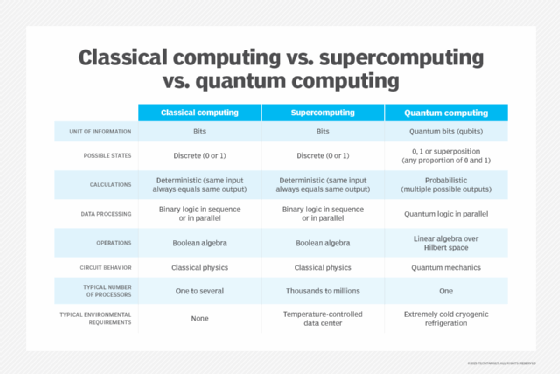Quantum computing and classical computing are two powerful technologies. Each has its strengths and weaknesses.
Quantum computing uses quantum bits, or qubits, to perform calculations. These qubits can exist in multiple states at once, allowing for faster processing of complex problems. On the other hand, classical computing relies on traditional binary bits, which are either 0 or 1.
This makes classical computers reliable for everyday tasks but slower for intricate computations. Comparing these two types of computing helps us understand their unique capabilities. It also sheds light on how they might shape the future of technology. Understanding these differences is key for anyone interested in the evolution of computing and its impact on various industries.
Introduction To Computing
Computing has transformed our world in unimaginable ways. From simple calculations to complex algorithms, computing has become essential. As technology evolves, so does the way we compute. This leads us to two main types: classical computing and quantum computing.
Origins Of Classical Computing
Classical computing began in the mid-20th century. Early computers used vacuum tubes and punch cards. These machines were large and slow. Over time, transistors replaced vacuum tubes. This made computers smaller and faster.
In the 1970s, microprocessors emerged. This allowed for personal computers. Software development grew rapidly. Classical computing uses bits, which are 0s and 1s. It processes tasks sequentially, one step at a time.
Emergence Of Quantum Computing
Quantum computing is a newer concept. It started in the 1980s. Scientists explored the potential of quantum mechanics in computing. Unlike classical bits, quantum computing uses qubits. Qubits can be 0, 1, or both at the same time.
This allows quantum computers to process information differently. They can solve complex problems faster. Quantum computing is still in its early stages. Researchers are developing stable quantum systems. These systems have the potential to outperform classical computers in certain tasks.
Fundamentals Of Classical Computing
Understanding the fundamentals of classical computing helps us appreciate its role in our digital world. Classical computing forms the backbone of modern technology, powering everything from smartphones to supercomputers. Let’s break down its core components.
Binary System
Classical computers use a binary system. This system comprises only two numbers: 0 and 1. These numbers, or bits, represent data. They form the foundation of all computing processes. Every calculation and operation boils down to these binary bits.
Transistors And Logic Gates
Transistors are tiny switches in classical computers. They control the flow of electricity. Logic gates are combinations of transistors. They perform basic operations, including AND, OR, and NOT. Together, transistors and logic gates process data.
Core Concepts Of Quantum Computing
Quantum computing is a groundbreaking area in modern science. It differs greatly from classical computing. Here, we explore some core concepts of quantum computing. These are essential for understanding its potential and differences.
Qubits And Superposition
In classical computing, bits are the basic units of information. They exist in one of two states: 0 or 1. Quantum computing uses qubits instead. Qubits can be in a state of 0, 1, or both simultaneously. This is due to a property called superposition.
Superposition allows qubits to process information in parallel. This capability can lead to much faster computations. It is one of the key differences between quantum and classical computing.
Entanglement
Entanglement is another crucial concept in quantum computing. It occurs when qubits become linked. The state of one qubit instantly influences the state of another, regardless of distance.
This property can enable powerful and secure communication methods. Entanglement also helps in solving complex problems more efficiently. It is a unique feature that sets quantum computing apart.
Key Differences
Quantum computing and classical computing differ in several fundamental ways. These differences impact their performance, applications, and potential. Understanding these key differences helps in grasping the future of computing technology.
Processing Power
Classical computers use bits for processing. These bits are either 0 or 1. Quantum computers, on the other hand, use qubits. Qubits can represent both 0 and 1 at the same time. This property is called superposition. It allows quantum computers to process vast amounts of data simultaneously. Classical computers process data sequentially. This limits their speed and efficiency.
Data Handling
Classical computers handle data through binary code. Each operation is a series of 0s and 1s. Quantum computers use quantum bits or qubits. Qubits can exist in multiple states at once. This is known as entanglement. Quantum computers can solve complex problems more efficiently. They can analyze and process large datasets faster.
Applications In Various Fields
Quantum computing and classical computing have distinct advantages. These advantages shine through in various fields. Let’s explore how they differ in their applications.
Cryptography
Classical computers use complex algorithms for encryption. These algorithms protect data from unauthorized access. Yet, they are not foolproof. Given enough time, even the toughest encryption can be cracked.
Quantum computers, on the other hand, offer a new level of security. They can solve complex problems faster. This speed makes current encryption methods obsolete. Quantum cryptography can create unbreakable codes. This method uses the principles of quantum mechanics. Eavesdropping on quantum communication changes the data. Thus, it alerts the user. This ensures high security and privacy.
Artificial Intelligence
Classical computers have driven AI development. They process vast amounts of data. They use algorithms to learn and predict outcomes. Machine learning and neural networks thrive on classical computing.
Quantum computing promises to enhance AI further. It can process information at unprecedented speeds. Quantum algorithms can handle more complex tasks. They can solve problems that classical computers can’t. This can lead to breakthroughs in AI research. Faster learning and better decision-making are possible. Quantum AI can revolutionize various industries.

Credit: www.techtarget.com
Challenges And Limitations
Quantum computing holds great promise. However, it faces significant challenges and limitations. These hurdles impact its development and practical applications. Understanding these challenges is key to grasping the differences between quantum and classical computing.
Hardware Constraints
Quantum computers require extremely low temperatures to function. This demands specialized cooling equipment. Such equipment is expensive and complex. The delicate nature of quantum bits, or qubits, adds to the challenge. Qubits can be easily disturbed by environmental factors. This makes maintaining a stable quantum state difficult. In contrast, classical computers do not face such stringent hardware requirements. They operate at room temperature and are more robust.
Error Rates
Quantum computers are prone to high error rates. Qubits can lose their quantum state, a process known as decoherence. This leads to computational errors. Quantum error correction codes exist. But they require many additional qubits. This increases the complexity of quantum systems. Classical computers, on the other hand, have much lower error rates. They use well-established error correction methods.
Future Prospects
Quantum computing and classical computing are two distinct paradigms. Each has unique advantages and limitations. The prospects of these technologies are worth exploring.
Technological Advancements
Quantum computing uses quantum bits or qubits. These can exist in multiple states at once. This allows quantum computers to process information much faster. Classical computers use binary bits. These bits can only be in one state at a time. This limits their processing speed.
Recent advancements in quantum computing include:
- Increased qubit stability
- Improved error correction methods
- Development of quantum algorithms
Classical computing continues to evolve. Innovations in hardware and software are ongoing. Yet, quantum computing holds the promise of solving complex problems. Problems that are beyond the reach of classical computers.
Potential Impact On Society
Quantum computing could impact various industries. These include healthcare, finance, and cybersecurity. In healthcare, quantum computers could analyze large datasets. This could lead to new drug discoveries.
In finance, quantum algorithms could optimize trading strategies. This might result in better investment returns. Quantum computing could also enhance cybersecurity. It could make encryption methods more secure.
Here’s a comparison of the potential impacts:
| Industry | Classical Computing Impact | Quantum Computing Impact |
|---|---|---|
| Healthcare | Data analysis | Drug discovery |
| Finance | Algorithmic trading | Optimized strategies |
| Cybersecurity | Encryption | Enhanced encryption |
The potential impact of quantum computing is vast. Yet, challenges remain. These include technical and ethical issues. The future of computing is exciting. Both quantum and classical computing will continue to play key roles.

Credit: www.berkeleynucleonics.com
Frequently Asked Questions
What Is Quantum Computing?
Quantum computing uses quantum bits or qubits to perform computations. Unlike classical bits, qubits can represent both 0 and 1 simultaneously. This allows quantum computers to solve complex problems much faster than classical computers.
How Does Classical Computing Work?
Classical computing relies on bits as the basic unit of information. Each bit can be either 0 or 1. Classical computers use logical operations on bits to perform calculations and process data.
What Are The Advantages Of Quantum Computing?
Quantum computing can solve complex problems much faster than classical computing. It is particularly useful for tasks like cryptography, optimization, and simulations of quantum systems.
Can Quantum Computers Replace Classical Computers?
Quantum computers are not expected to replace classical computers. They are specialized tools for specific tasks. Classical computers will continue to be essential for general-purpose computing needs.
Conclusion
Quantum computing and classical computing each have unique strengths. Quantum computing excels in complex problem-solving. Classical computing remains reliable for everyday tasks. Both will coexist and complement each other. Rapid advancements in technology will shape their future roles. Understanding both helps us prepare for the next tech era.
Stay curious and informed. The computing world is evolving fast. Embrace the changes and opportunities ahead.









